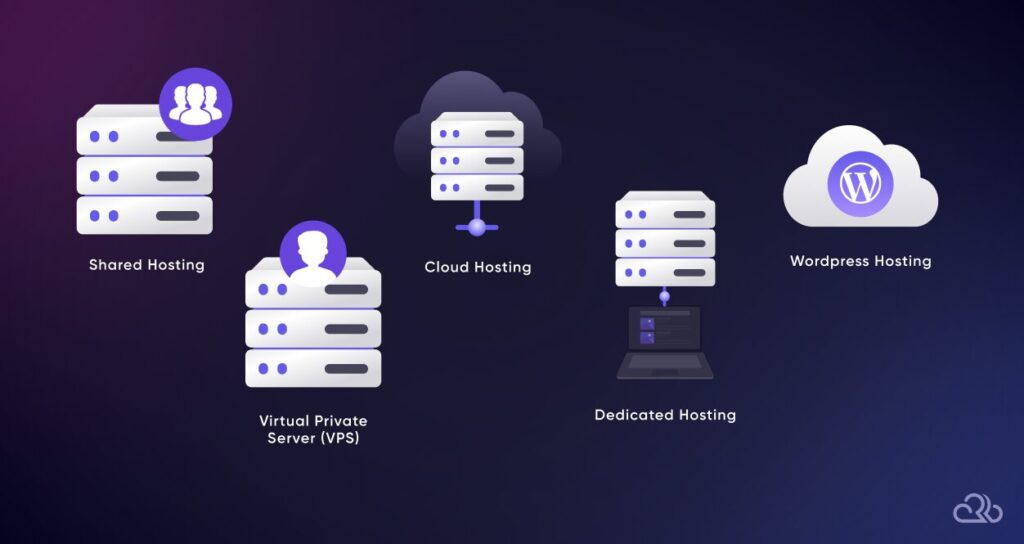

Are you navigating the vast ocean of web hosting options, wondering, How to Choose Best Hosting for Your Business Purpose?
With over 330,000 Web Hosting Companies Worldwide, each offering a unique blend of services, features, and pricing, the quest to find the perfect fit for your business can feel like searching for a needle in a digital haystack.
Choosing the right web hosting isn’t just about what you prefer; it’s crucial to find a service that’s reliable, scalable, and secure for your website’s needs. This guide is here to help, offering straightforward advice and important factors to consider so you can make a well-informed choice.
Before we delve into selecting the best hosting for your business, let’s first understand your website needs.
Pinpointing What Your Website Demands
To find the ideal web host, it’s essential to clearly define your website’s demands. Here’s a reshuffled list of considerations:
Budgeting for Web Hosting
Start by setting a clear budget for your web hosting needs. The cost of hosting services varies, so establishing a budget early on will help you manage expenses effectively and choose a service within your financial reach.
Security Priorities
Determine the level of security necessary for your website. For instance, sites that handle sensitive customer information, like online stores, need top-notch security measures to protect data.
Expected Visitor Traffic
Assess the amount of traffic you anticipate your website will receive. This foresight is crucial for selecting a hosting plan that can smoothly accommodate your expected traffic volume.
Website Creation Tools
Choose between using a self-hosted platform or a hosting service that comes with website-building capabilities. Opt for a web host that supports the platform or tools you prefer for building your site.
Website Objectives
Clarify your site’s main objectives. Whether it’s for personal use, such as a blog or portfolio, or for business purposes like a company landing page, your goals will dictate the hosting resources required.
Storage and Feature Needs
Consider the bandwidth and storage your website will need to operate efficiently. Also, think about the potential for growth and scalability offered by the hosting provider to ensure your site has room to expand.
How Do I Choose a Website Host for My Business?

When it comes to finding the best hosting provider for WooCommerce, identifying what your website aims to achieve is the first crucial step. Different websites serve different purposes; a blog, for example, won’t have the same requirements for LMS hosting services. The nature of your site dictates the type of hosting service you should look for, especially in terms of features like e-commerce capabilities and content management systems.
Comparing Hosting Providers with a Critical Eye
Embarking on the journey to find the right hosting provider means diving into research and comparisons. It’s essential to evaluate the credibility of each potential host. Using reliable review sites and checking for trial offers or money-back guarantees can provide insights into the quality of service.
Moreover, ensuring they offer responsive customer support across multiple channels can save you from potential future headaches.
Delving into the Technical Aspects
The backbone of any hosting service is its technology. Providers that leverage advanced server technologies, such as LiteSpeed Web Servers, can offer better security and performance. Consider the location of the provider’s data centers for optimal site speed and check if they facilitate easy website migration, which is especially important if you’re looking to switch hosts.
Additionally, the availability of domain registration and custom email addresses through your hosting provider can significantly enhance your business’s professionalism.
Securing Reliable Support
A web host that stands by 24/7 ready to assist is invaluable. Beyond the availability of support, the quality matters—having access to a detailed knowledge base, engaging tutorials, and diverse communication channels like live chat, email, and phone support can dramatically improve your experience. This dedicated support system ensures your website remains operational, addressing any issues promptly and efficiently.
Selecting the Right Type of Hosting Service
Finally, understanding the spectrum of hosting services available is vital. From dedicated to shared and VPS to cloud and WordPress specialized hosting, each has its advantages and best use cases. The choice should reflect your website’s traffic expectations, security requirements, and growth prospects.
Evaluating the balance between cost, features, and the level of management offered (self-managed vs. managed hosting) will guide you to the hosting plan that best fits your business goals.
There are also different types of hosting services available, and each one has its own benefits and downsides. To help identify which option will suit your website best, let’s take a closer look at each web hosting type below.
What Are the 5 Types of Hosting?

Shared Hosting: The Gateway to Going Online
Shared hosting is where your website lives on a server shared with other websites, making it the most cost-effective option for many. It’s particularly suited for sites with low to medium traffic, such as blogs, personal portfolios, and small business websites.
The appeal of shared hosting lies in its simplicity and user-friendliness, with many providers offering intuitive control panels for easy site management. However, the shared nature of the resources means that your site’s performance could be affected by other sites on the same server.
Virtual Private Server (VPS) Hosting: The Middle Ground
VPS hosting offers a step up from shared hosting, providing dedicated resources on a shared server through virtualization technology. This option strikes a balance between cost and performance, offering more stability and resources than shared hosting without the price tag of dedicated hosting.
VPS hosting is ideal for medium-sized businesses that require more control and resources but are not ready to invest in a dedicated server. Although it requires more technical knowledge, many providers, such as Hostinger, simplify the process with user-friendly management tools and support for various operating systems.
Cloud Hosting: For Scalability and Reliability
Cloud hosting represents a significant leap in hosting technology, offering high scalability and reliability. Your website is hosted across a network of virtual servers, ensuring that it remains operational even if one server goes down. This type of hosting is perfect for businesses expecting fluctuating traffic or those in need of high availability.
Cloud hosting combines the ease of shared hosting with the performance and resources closer to that of VPS hosting, making it suitable for a wide range of business sizes and types.
Dedicated Hosting: The Pinnacle of Performance
Dedicated hosting provides the ultimate control and resources, offering an entire server for your website. This option is best suited for large-scale businesses and high-traffic sites requiring top-tier performance, security, and customization.
While dedicated hosting comes with a higher price point and demands significant technical expertise, the investment is well justified for businesses that cannot afford any compromise on performance and reliability.
WordPress Hosting: Tailored for the World’s Favorite CMS
WordPress hosting is specifically designed to optimize the performance and security of websites powered by WordPress, the world’s most popular content management system. This type of hosting can range from shared to dedicated environments but is fine-tuned for WordPress. Features often include one-click installations, automatic updates, and specialized support, making it an attractive option for users at all technical levels.
Providers like Rapyd.cloud dedicatedly design their WordPress hosting plans with performance-boosting features and security measures to ensure your site runs smoothly.
Things to Be Considered to Choose Best Hosting for Your Business Purpose

Selecting the perfect hosting for your business website is a multifaceted process that involves more than just comparing prices. To ensure your website performs optimally, supports your business growth, and provides a secure environment for your customers, several critical factors must be considered:
Platform Compatibility: CMS vs. Website Builder
Understanding whether your site will run on a Content Management System (CMS) or if you’ll utilize a website builder is crucial. CMS platforms like WordPress, Joomla, and Drupal offer flexibility and the ability to customize your site extensively but often require a bit more technical knowledge to manage.
On the other hand, website builders offer a more straightforward, less technical route to getting your site up and running, ideal for those seeking simplicity and ease of use. Your choice will influence the hosting services you consider, as some are better suited to specific platforms.
Storage and Bandwidth Needs
The amount of storage and bandwidth your website requires is dictated by its size and the volume of traffic it receives. Storage is necessary for all your website’s files, while bandwidth affects how quickly your site can serve those files to visitors.
Evaluating your needs in these areas is essential for choosing a hosting package that ensures your site runs smoothly without unnecessary expense for unneeded capacity.
Speed and Performance Optimization
A fast-loading website is vital for user experience and SEO ranking. Opt for hosting services that offer performance-enhancing features like caching, the use of a Content Delivery Network (CDN), and data centers located near your primary audience to minimize load times. These features can significantly impact your website’s accessibility and visitor satisfaction.
Security Measures
Protecting your website from cyber threats is non-negotiable. Look for hosting providers that offer robust security features such as SSL certificates, firewalls, and regular backups. Ensuring your website is secure not only protects your business but also builds trust with your visitors.
Reliability and Uptime
Your website’s availability is critical; even small amounts of downtime can lead to lost revenue and diminished trust in your brand. Seek out hosting services with high uptime guarantees and reliable customer support to address any issues promptly.
Customer Support Availability
When issues arise, having access to responsive, knowledgeable support can make a significant difference in resolving problems quickly. Evaluate potential hosting providers based on the support channels they offer—such as live chat, email, and phone support—and their reputation for customer service.
Ease of Management
For many business owners, managing a website is just one of many responsibilities. A hosting provider that offers an intuitive control panel and easy-to-use tools for site management can save you time and frustration. Additionally, resources like tutorials and a comprehensive knowledge base can be invaluable for troubleshooting and learning.
Scalability
As your business grows, so too might your website. Consider how easy it is to upgrade your hosting plan or add resources. The ability to scale quickly and efficiently is crucial for supporting business expansion without the need for a complete overhaul of your hosting arrangement.
Price vs. Value
While cost is always a consideration, the cheapest option is not always the best when it comes to hosting. Assess the value each hosting provider offers, considering their reliability, feature set, and support, to find the best fit for your budget and business needs.
FAQs
Yes, most websites can migrate to a new hosting provider. Look for hosts offering migration services to ease the transition.
While some hosting types (like VPS or dedicated hosting) may require technical skills, many providers offer managed services and user-friendly control panels that minimize the need for technical management.
Beware of providers with no clear uptime guarantees, negative reviews, limited customer support options, and a lack of transparency about pricing and renewal fees.
Your choice between a CMS and a website builder can influence your hosting decision. Some hosts specialize in certain CMS platforms (like WordPress) with optimized performance and support, while others might offer integrated website builders for ease of use.
Shared Hosting: Multiple websites share the same server resources. Ideal for small to medium sites.
VPS (Virtual Private Server) Hosting: A shared server, but with dedicated resources for each site. Suits medium-sized businesses.
Cloud Hosting: Utilizes multiple servers for high reliability and scalability. Good for businesses with fluctuating traffic.
Dedicated Hosting: Offers an entire server for one website, providing maximum control and resources. Best for large businesses.
Conclusion
Selecting the ideal web hosting is crucial for your business’s success, requiring a thoughtful balance of needs, security, and budget. By prioritizing scalability, reliability, and support, you can secure a hosting solution that not only meets your current demands but also supports future growth.
The right hosting ensures a flawless online experience for your customers, positioning your business for success in the ever-evolving digital world. Make an informed choice to lay a strong foundation for your digital journey.








